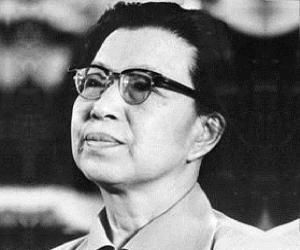


Jiang Qing, who was active in the local theatre scene while attending the National Qingdao University during the early 1930s, performed in the popular Chinese street play ‘Put Down Your Whip’, about a woman who escapes from Japanese-occupied north-eastern China and performs in the streets to survive, after joining the ‘Communist Cultural Front’, a circle of artists, writers, and actors.
Jiang Qing started acting in amateur theater troupes after relocating to Shanghai in 1933, and following her brief arrest due to political activities, took the stage name Lan Ping, meaning "Blue Apple", with which she became popular for portraying the rebellious housewife Nora in director Zhang Min’s adaptation of Henrik Ibsen’s play ‘A Doll House’. It earned her a contract with the Diantong Film Company, which cast her in a small role as a female soldier in the 1935 drama film ‘Goddess of Freedom’. The same year, she appeared in another supporting role in the comedy-drama film ‘Scenes of City Life’, also starring her future husband Tang Na, but the production company went out of business shortly after.
Jiang Qing later joined Lianhua Film Company and gained recognition for appearing in the 1936 drama film ‘Blood on Wolf Mountain’ by famous Shanghai director Fei Mu. Qing, who co-starred with popular actress Li Lili in the allegorical movie about Japanese aggression, played the supporting role of Liu Sansao, who musters the courage to fight back wolves harassing her village. The following year, she appeared as a rickshaw puller’s wife in the segment ‘Two Yuans’ of the Chinese anthology film ‘Lianhua Symphony’. In 1938, she finally bagged the lead role of Li Nv in the Lianhua-produced movie ‘Wang Laowu’, directed by Cai Chusheng, in which she played a poor young woman who marries a homeless wanderer after he helps her sick and dying father. In the meantime, she had collaborated with Zhang Min again to appear in the lead role in his production of Alexander Ostrovsky’s play ‘The Storm’ in February 1937, but was dismissed by Lianhua Film Company following a scandal about her secret relationship with the married director. Qing, who later became involved in politics as Madame Mao, fourth wife of supreme Chinese leader Mao Zedong, appeared in several documentaries over the years, some during her lifetime.


